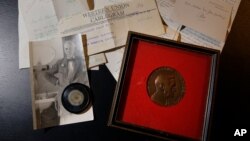On September 7, the governor of Russia’s Rostov region, Vasily Golubev, claimed on the state-owned Don 24 TV channel that Soviet scientist Zinaida Ermolyeva invented penicillin:
"Zinaida Vasilievna Ermolyeva. … If you pass by Pervomaisky Square or Park … there is a monument to her, which we erected not so long ago. And if we go back to the history of the Great Patriotic War, this is that woman. She is our countrywoman. She studied here — who was called Madame Penicillin. She invented penicillin.”
That is false.
Ermolyeva, a microbiologist, experimented with penicillin during World War II, decades after it was discovered.
Fleming was the first to isolate penicillin in 1928. Florey and Chain then developed it as a medicine. They were awarded the Nobel Prize in Physiology or Medicine in 1945.
Penicillin, the first antibiotic with broad antimicrobial activity, is effective against severe bacterial infections such as pneumonia, syphilis, gangrene and tuberculosis, among others.
Ermolyeva was credited with bold experiments, some of which led to breakthrough inventions and helped save lives.
However, the idea that Ermolyeva invented penicillin was a creation of Soviet dictator Josef Stalin’s propaganda.
She began experimenting with antibiotics at the Rostov Institute of Virology in 1942 and later that year was able to isolate a penicillin strain that was then tested in hospitals on wounded Soviet soldiers.
A Soviet propaganda leaflet-style profile of Ermolyeva is still available on the UNESCO website.
The profile describes her invention of the “first domestic antibiotic during the Great Patriotic War” this way: “... from a mold scraped off the walls of bomb shelters near Moscow, a drug similar to penicillin was obtained named Krustozin. The first clinical trials were conducted on seriously wounded soldiers, and the results exceeded all expectations.”
In reality Krustozin, or Soviet penicillin, caused fever and other serious side effects, proved to be unstable and impossible to store, and had to be discontinued. After this failure, Soviet scientists switched their penicillin research technology to the “Western models,” the Russian state news agency Tass reported in a 2016 “History of the Discovery of Penicillin.”
Still, Soviet propaganda glorified Ermolyeva, who received the Soviet Union’s highest awards, including the Stalin Prize and several Orders of Lenin. Fiction books were written about her, and a monument to her was erected in Rostov-on-Don.
The Rostov region governor's reanimation of the Soviet penicillin invention myth comes amid the rise of Stalin-era nostalgia in Russia, with the Kremlin’s historic revisionism manifesting itself in every aspect of people’s lives — from statements by top officials to the news media and the education system.





